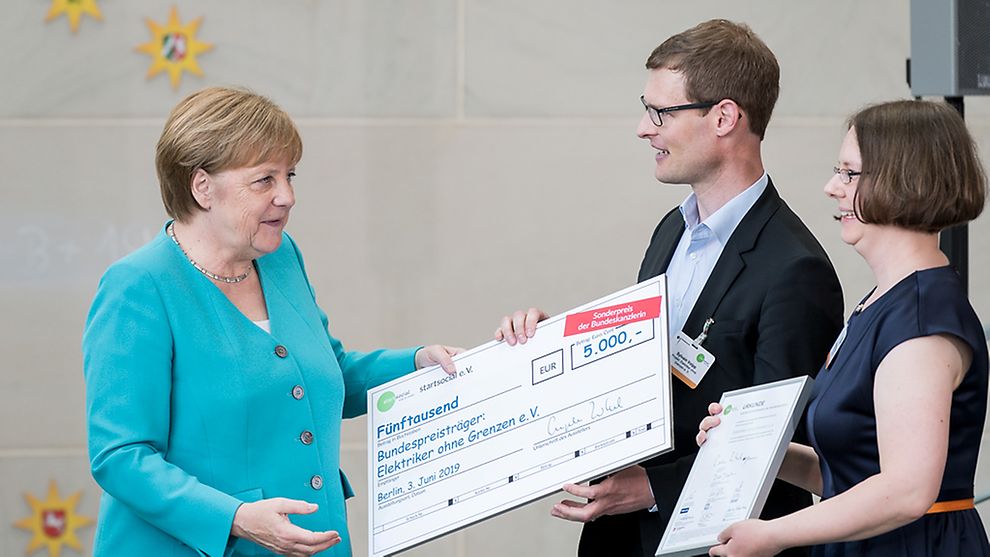News
EWWBNA German Partner Receives Best Practice Award
EWWBNA German Partner Receives “The Chancellor's Special Award” for Best Practice
Start Social Award Ceremony
In June, at the Federal Chancellery in Berlin, 25 non-profit organizations were invited to the annual “Start Social Award Ceremony”, a special event of the Government of Germany promoting best-practices.
Six of the organizations won special recognition and one organization stood out among them all and was honored with “The Chancellor's Special Award”. That organization was Elektriker ohne Grenzen (Electrical Workers Without Borders Germany), EWWBNA's partner in Germany.
Chancellor Angela Merkel, who presented the award, praised EWWB Germany, saying: “Special initiatives deserve special attention and support. And they also deserve special awards.”
Receiving the Chancellors' award on behalf of EWWB Germany were the organization's founders Sylvain Volpp and Angelika Wegner.
EWWB Germany was founded in 2012 and shares the goals and objectives of EWWBNA. It fields volunteer power professionals, as the Chancellor noted in her remarks, “to isolated regions in the world to bring electrical energy, whether in Tanzania or Vietnam, Nepal, Laos or other countries – they bring electricity to schools and hospitals, to orphanages and training centers, or simply to the streets to make them brighter and safer.”
At the conclusion of her remarks, the Chancellor added, “Electrical Workers Without Borders helps bring light into the darkness of everyday life.”
EWWBNA President, Don Siegel, in a note congratulating EWWB Germany, said “It is a wonderful tribute to the contributions of your organization and volunteers in making the world a better place”.
To view the YouTube video of the award ceremony: https://youtu.be/5n5Tz6jp_SI
English translation of Chancellor Merkel's full remarks:
Remarks from Chancellor Angela Merkel at Start Social Award Ceremony Honoring EWWB Germany
(English translation from German)
Ladies and gentlemen
As a contestant, you've already had suspense behind you – now there's a bit more. This is an extraordinary event for you today. The situation is different with everyday things. We usually overlook these because they seem to us to be self-evident. Who thinks in the morning about what luck it is that clean drinking water comes out of the tap? You only notice this when you don't have water. Or who thinks about how great it is that electricity comes out of the socket? This and much more is part of our daily life. We can hardly imagine that such things do not exist. But for many people around the world, this is the daily reality: more than two billion people do not have access to clean drinking water, and more than a billion people have no or insufficient access to electricity.
What is working without electricity today? How should a hospital work without electricity, how should a company? How should schools fulfill their educational mission? Without electricity, a region is literally shut down – it can hardly develop, it is caught in a difficult poverty trap. This problem should be solved in the 21st century, there must be a solution.
Electrical Workers Without Borders probably thought similarly before they founded their association in Karlsruhe in 2012. Electrical Workers Without Borders set to work on a voluntary basis and, of course, full of energy. They set off to isolated regions in the world to bring electrical energy. Whether in Tanzania or Vietnam, Nepal, Laos or other countries – they bring electricity to schools and hospitals, to orphanages and training centers, or simply to the streets to make them brighter and safer.
Anyone who has ever heard stories about what it is like when children see electric light for the first time and, for example, do homework under the streetlights in the evening – which is not so popular in Germany; but they do it with passion, because they can finally see something even after dark – will understand how important this is.
Electrical Workers Without Borders rely on renewable energies such as solar systems. They involve the local population in their projects – very important – and work together with local craftsmen – even more important. Thus, not only electricity flows, but also know-how, and this ensures sustainability.
Special initiatives deserve special attention and support. And they also deserve special prizes.
Dear Mr. Volpp and Mrs. Wenger – it is nice that there is a female electrician or at least one who is interested in electricity – I am very pleased to honor Electrical Workers Without Borders for their commitment. Electrical Workers Without Borders help to bring light into the darkness of everyday life. I wish you many more successful projects. And now I would like to ask you both to come forward.

